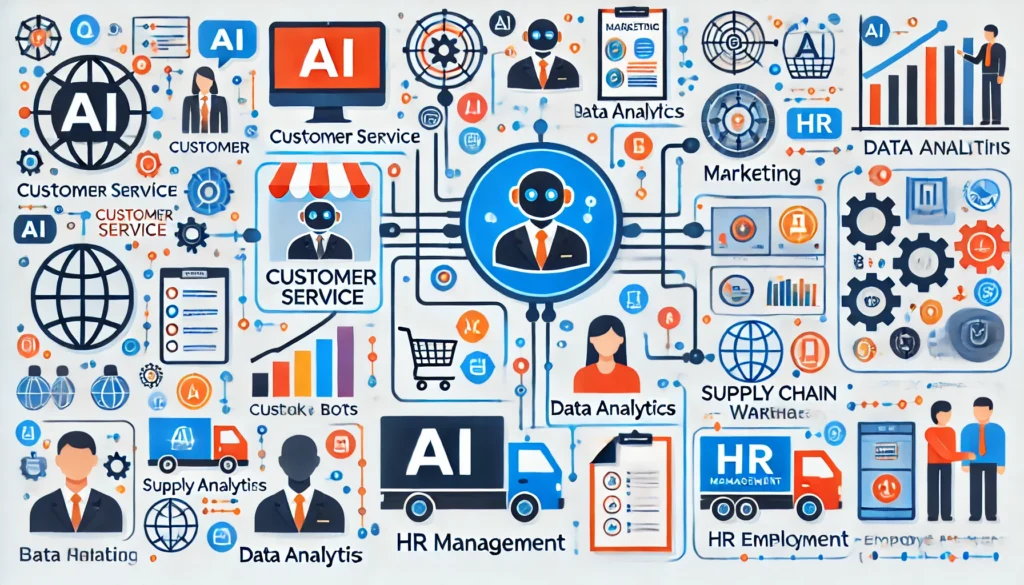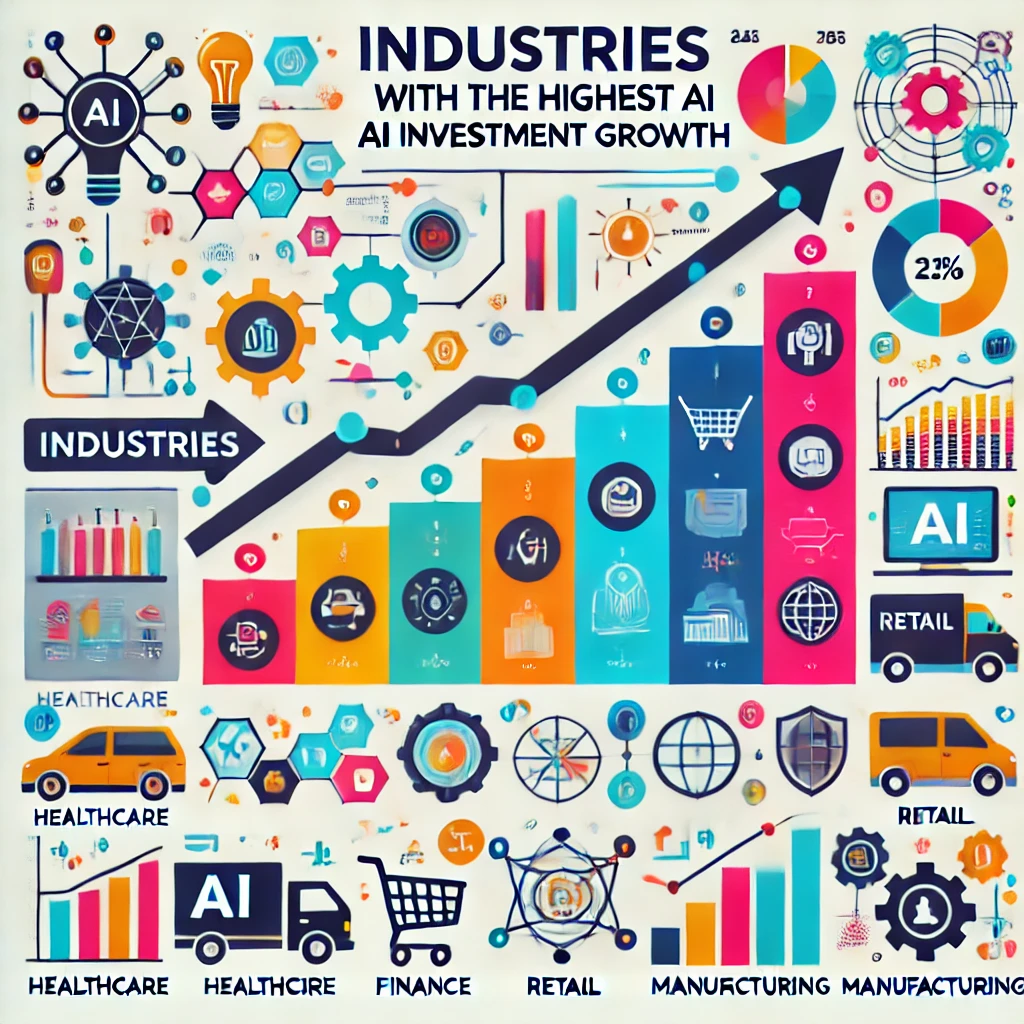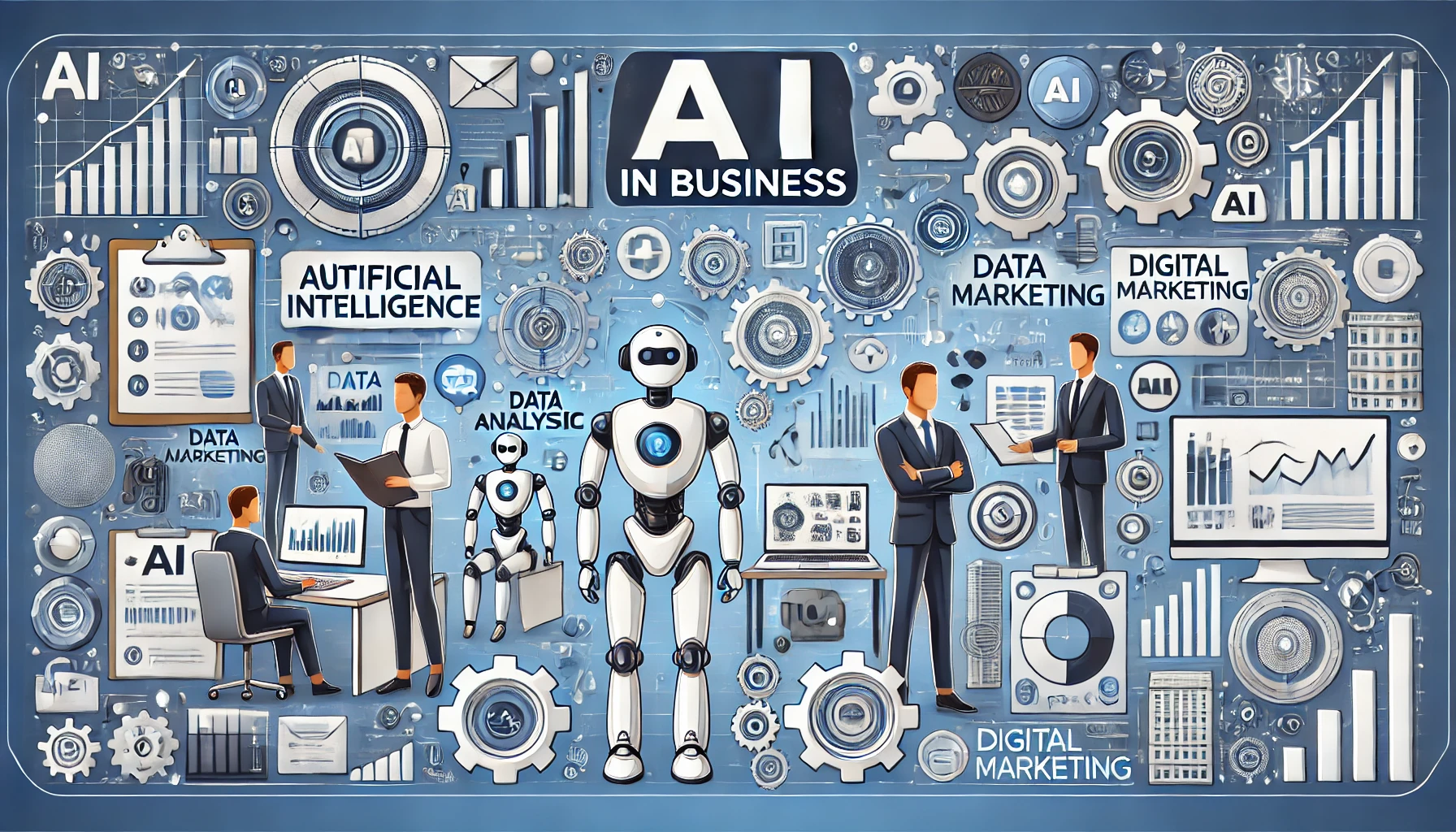Introduction
Imagine having a tool in your business that works around the clock, streamlining tasks, analyzing data, and even enhancing customer experiences—all while you focus on big-picture strategies. Welcome to the world of Artificial Intelligence (AI). If you’ve ever wondered how AI can transform businesses or where to begin, you’ve come to the right place. This guide breaks down the essentials of AI in business for beginners, offering insights into its benefits, challenges, and applications.
Table of Contents
What is Artificial Intelligence (AI), and How Does It Differ from Machine Learning (ML)?
AI refers to the simulation of human intelligence in machines, enabling them to perform tasks like problem-solving, learning, and decision-making. Machine Learning (ML), a subset of AI, focuses specifically on teaching machines to learn from data and improve over time without being explicitly programmed.
Key Difference:
- AI: Broader concept encompassing all intelligent systems.
- ML: Specific method within AI using algorithms to process data.
How Can AI Benefit Businesses?
AI offers a range of benefits, including:
- Enhanced Efficiency: Automates repetitive tasks, freeing up time for strategic work.
- Data-Driven Decisions: Analyzes vast amounts of data for actionable insights.
- Improved Customer Experiences: Personalizes interactions and resolves issues faster.
- Cost Savings: Reduces operational costs by streamlining workflows.

Key Applications of AI in Business Operations
AI is reshaping how businesses operate. Here are the primary areas of application:
1. Marketing and Sales
- AI Tools: Chatbots, predictive analytics, and content optimization.
- Benefits: Tailored campaigns and better customer targeting.
2. Supply Chain Management
- AI Tools: Demand forecasting and inventory optimization.
- Benefits: Reduces waste and improves delivery timelines.
3. Customer Service
- AI Tools: NLP-powered chatbots like Zendesk Chatbot.
- Benefits: 24/7 support and faster response times.
4. Cybersecurity
- AI Tools: Anomaly detection and automated threat analysis.
- Benefits: Identifies vulnerabilities and responds to threats in real-time.
| Feature/Criteria | Salesforce Einstein | IBM Watson Studio | Microsoft Power BI |
|---|---|---|---|
| Primary Purpose | AI and analytics for CRM and business data | Data science, AI model development, and deployment | Data visualization and business intelligence |
| Target Users | Sales, marketing, and service teams | Data scientists, developers, analysts | Business analysts, decision-makers |
| Key Features | Predictive analytics, NLP for chatbots, AI-powered recommendations, automated workflows | Data preparation, machine learning, AutoAI, deep learning, integration with Watson AI | Interactive dashboards, real-time reporting, integration with Power Platform |
| Ease of Use | Designed for non-technical users | Advanced users with coding expertise | User-friendly for analysts, integrates well with Microsoft tools |
| Integration Options | Deep integration with Salesforce ecosystem | Integrates with cloud platforms like AWS, Azure, and IBM Cloud | Tight integration with Microsoft ecosystem (Excel, Azure, Teams, etc.) |
| AI/ML Capabilities | Built-in AI for customer insights and process automation | Comprehensive AI/ML modeling capabilities | AI-driven insights, automated report generation |
| Customization | Limited to Salesforce ecosystem needs | Highly customizable through Python, R, and other programming languages | Customizable dashboards and reports with DAX, Power Query |
| Deployment | Cloud-based | Cloud and on-premises | Cloud, on-premises, and hybrid |
| Strengths | CRM-focused AI, ease of use for business roles | Robust AI/ML capabilities, data science flexibility | Exceptional BI, real-time analysis, and integration with |
What Industries Are Most Impacted by AI Adoption?
AI adoption is revolutionizing industries, including:
- Retail: Personalized shopping experiences.
- Healthcare: Diagnostic tools and patient care optimization.
- Finance: Fraud detection and algorithmic trading.
- Manufacturing: Predictive maintenance and automation.

How Do I Start Integrating AI Into My Business Processes?
Getting started with AI doesn’t have to be daunting. Follow these steps:
- Identify Pain Points: Determine which processes need improvement.
- Set Clear Goals: Define what you aim to achieve with AI.
- Choose the Right Tools: Start with beginner-friendly platforms like ChatGPT or Microsoft Power BI.
- Pilot Projects: Test on a small scale before scaling up.
- Monitor and Optimize: Continuously analyze performance metrics.
What Are the Costs and Challenges of Implementing AI in a Business?
Costs:
- Initial investment in software and hardware.
- Ongoing maintenance and updates.
Challenges:
- Data Quality: AI depends on accurate, clean data.
- Workforce Readiness: Requires training for effective adoption.
- Ethical Concerns: Balancing innovation with privacy.
Cost-Effective AI Solutions for Startups
Startups can leverage affordable AI tools to enhance productivity, reduce operational costs, and scale efficiently. Here are some accessible solutions:
- Automation Anywhere:
A robotic process automation (RPA) tool that automates repetitive tasks, such as data entry, invoice processing, or workflow management. It’s scalable, user-friendly, and offers tailored packages for small businesses. - Notion AI:
Integrated with Notion, this tool provides AI-powered writing assistance, task management, and idea generation. It’s ideal for startups seeking to streamline documentation, content creation, and collaboration.
Both tools are cost-effective and allow startups to adopt AI without requiring extensive technical expertise.
Recommended Tools and Platforms for Beginners
Here are some top tools to kickstart your AI journey:
| Tool | Function | Ideal For |
|---|---|---|
| ChatGPT | Content creation, customer support | Small businesses |
| Salesforce Einstein | Workflow automation, predictive insights | Marketing and sales |
| Tableau | Data visualization | Analytics teams |
| Jasper | AI writing assistance | Marketing copywriting |
| Automation Anywhere | Robotic process automation | Operational efficiency |
How Can AI Improve Customer Experience and Personalization?
AI excels at creating tailored experiences for customers by analyzing behavior patterns and preferences. For instance:
- Chatbots: Answer FAQs and guide customers.
- Recommendation Engines: Suggest products based on past purchases.
- Predictive Analytics: Anticipate customer needs before they arise.
Retail Business Leveraging AI-Driven Personalization
Company Name: FashionForward (Hypothetical Example)
Industry: Retail (Fashion and Apparel)
Challenge: FashionForward, a mid-sized retail clothing brand, faced increasing competition in the e-commerce space. The company wanted to enhance customer engagement, increase online sales, and reduce cart abandonment rates. They identified a lack of personalized customer experiences as a significant barrier to achieving these goals.
Solution: FashionForward implemented an AI-driven personalization engine that leveraged machine learning algorithms to analyze customer data, predict preferences, and deliver tailored experiences across digital touchpoints.
Ethical Considerations for Businesses Using AI
Using AI responsibly is crucial. Key considerations include:
- Transparency: Clearly disclose AI usage to customers.
- Bias Mitigation: Ensure algorithms are trained on diverse datasets.
- Privacy Protection: Adhere to data security regulations like GDPR.
Ethical Best Practices for AI in Business
| Category | Best Practice | Description |
|---|---|---|
| Transparency | Disclose AI Usage | Clearly inform stakeholders when and how AI is being used in processes, products, or decision-making. |
| Fairness | Avoid Bias | Use diverse training datasets and regularly audit models to ensure decisions are unbiased and equitable. |
| Privacy | Protect User Data | Follow robust data protection standards like GDPR or CCPA to secure user data and ensure informed consent. |
| Accountability | Assign Responsibility | Define clear accountability for AI decisions and outcomes, with mechanisms to address errors or disputes. |
| Explainability | Make AI Decisions Understandable | Ensure AI models provide clear, interpretable reasoning behind decisions, especially for critical applications. |
| Safety | Prioritize Reliability | Design AI systems to perform consistently and implement safeguards to avoid harm in case of malfunctions. |
| Sustainability | Minimize Environmental Impact | Optimize AI processes to reduce computational and energy footprints. |
| Continuous Monitoring | Regularly Evaluate Performance | Continuously assess AI systems for ethical compliance, accuracy, and unintended consequences. |
| Inclusivity | Design for Accessibility | Ensure AI solutions are accessible to diverse user groups, including those with disabilities. |
| Collaboration | Engage Stakeholders | Involve customers, employees, and regulators in AI development and deployment discussions. |
This table outlines the key ethical considerations businesses should follow to ensure responsible AI deployment.
How Can Small Businesses Leverage AI Without Significant Investment?
Small businesses can benefit from AI without breaking the bank:
- Use Freemium Tools: Platforms like Notion AI offer free tiers.
- Focus on Low-Cost Automation: Automate email marketing with tools like Klaviyo.
- Outsource Expertise: Hire freelancers or agencies for project-specific needs.
Conclusion: AI in Business
Artificial Intelligence is no longer just a buzzword; it’s a transformative force for businesses of all sizes. By starting small, focusing on key pain points, and using beginner-friendly tools, you can harness the power of AI to drive efficiency, enhance customer experiences, and make smarter decisions. Ready to take your first step into the AI-powered future? Start exploring the tools and strategies mentioned in this guide today!




